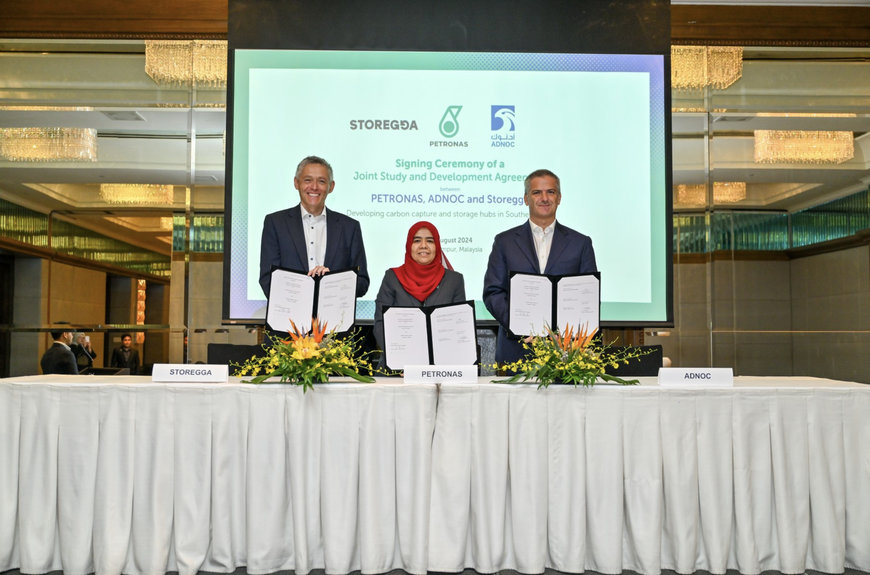www.industry-asia-pacific.com
21
'24
Written on Modified on
PETRONAS, ADNOC AND STOREGGA TO COLLABORATE ON OFFSHORE CARBON CAPTURE AND STORAGE IN MALAYSIA
The agreement is targeting at least 5 million tonnes per annum (mtpa) of CO2 capture and storage capacity by 2030.
uk.pli-petronas.com

PETRONAS, ADNOC and Storegga announced the signing of a Joint Study and Development Agreement (JSDA) to evaluate the carbon dioxide (CO2) emissions storage capabilities of saline aquifers and the construction of carbon capture and storage (CCS) facilities in the Penyu basin, offshore Peninsular Malaysia.
The agreement is targeting at least 5 million tonnes per annum (mtpa) of CO2 capture and storage capacity by 2030 and its scope includes a CO2 shipping and logistics study, geophysical and geomechanical modelling, reservoir simulation and containment research while exploring the application of advanced technologies, including artificial intelligence (AI), to enhance storage capacity.
Nora’in Md Salleh, PETRONAS CCS Solutions Sdn. Bhd. (PCCSS)’s Chief Executive Officer said, “This agreement with ADNOC and Storegga will potentially allow us to build our capability to develop and de-risk saline aquifers as carbon dioxide storage sites by leveraging on our partners’ expertise and experience in other regions. This strategic partnership aligns with PETRONAS’ overarching goal of establishing Malaysia as a regional CCS hub to serve Asia Pacific where it may build up the storage capacity through saline aquifers. This also demonstrates our earnestness in establishing the right pace to deliver CCS hubs here while also contributing to the national climate target.”
PETRONAS is a member of Malaysia’s National Energy Transition Roadmap (NETR) Committee, which has identified CCS as one of six energy transition levers to enable the country to be sustainable, low-carbon and resilient. The Malaysian Government is set to table a standalone CCUS bill by the end of 2024.
Having Storegga as a partner to collaborate in Malaysia is imperative, as Storegga is one of the few companies that boldly took the first steps to progress CCS globally when it was in its infancy stage. Today, Storegga is widely recognised as one of the leading players in this space.
Malaysia's geological abundance of deep saline aquifer reservoirs should allow for the development of large-scale, permanent CO2 storage solutions and the agreement will significantly accelerate regional CCS deployment, while strengthening collaboration between the strategic partners. The success of this initiative will lay the foundations for a regional CCS hub serving both domestic and international emitters.
ADNOC is targeting a carbon capture capacity of 10 mtpa by 2030, which is the equivalent of emissions to those released by 2 million internal combustion vehicles.
The JSDA’s activities are provisionally scheduled to begin later this year.

